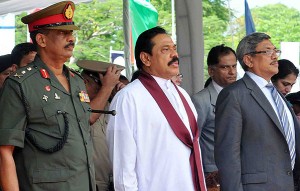Wars are not gentlemanly affairs: Sri Lanka shouldn’t fear int’l probe
Wars are not gentlemanly affairs. They are won by the most ruthless and aggressive side. Surely, no army has ever triumphed

Former Army Commander General Sarath Fonseka, Pesident Rajapakse and Defence Secretary Gotabaya Rajapakse
without some acts of savagery perpetrated in the heat of battle by frightened soldiers who know they must kill or be killed.
War crimes are less about such slayings, deplorable though they are, but more about premeditated slaughter stemming from a command policy, for instance an order to take no prisoners.
There can be no doubting the barbarity of the defeated Tamil Tigers, toward their own people and their own soldiers as much against the Singhalese majority who opposed Tamil independence and the Sri Lankan Army forces who for so long battled to defeat them. Despite years of wanton violence against their soldiers and civilians, the Sri Lankan authorities insist their forces behaved according to the rules of war in the final battles that destroyed the Tamil Tigers and their inflexible leader Velupillai Prabhakaran. This is as it should be.
It therefore does not make sense that Colombo should be so very angered by calls for outside investigation into allegations being made against their armed forces. The Sri Lankans share with the Americans, an opposition to the International Criminal Court in The Hague, on the grounds that they should always try their own nationals. The response, therefore, to international concerns over the conduct of their military is for the Sri Lankan government to take up the allegations and have them tested in an open inquiry held on its own soil.
It is not good enough to dismiss absolutely all-foreign concerns as being motivated by expatriate Tamils. In the same way, the authorities cannot blame international worries about the camps they have established for 250,000 Tamil refugees on malign and biased influence. UN Secretary-General Ban Ki-moon, who visited what seems to have been a “show” camp has said his officials have evidence that it was by no means representative.
There is an easy way to resolve this and that is for Colombo to permit neutral observers free access to all refugee facilities. They will then be able to prove they have nothing to hide. To refuse such scrutiny must inevitably make outsiders suspect the government is not being entirely straightforward. President Mahinda Rajapaksa surely cannot fail to see how his administration’s attitude is undermining its own argument. Nor will anxieties be lessened by the government’s airy dismissal of criticism of the camps coming from none other than Sri Lanka’s own Chief Justice Sarath Silva, saying the judge was “entitled to his opinion”.
The problem is that past Sri Lankan governments have “form”. In the wake of the 2004 Tsunami, the great quantities of foreign aid that flowed into Sri Lanka were for weeks simply not distributed to Tamil coastal villages, even though they were under government control.
If it remains obdurate, Colombo faces the very real danger that its military triumph will be dissipated by the way in which it is setting about the peace. How much fresh Tamil bitterness is now being sowed in these refugee camps?
published first on 2009-06-07
